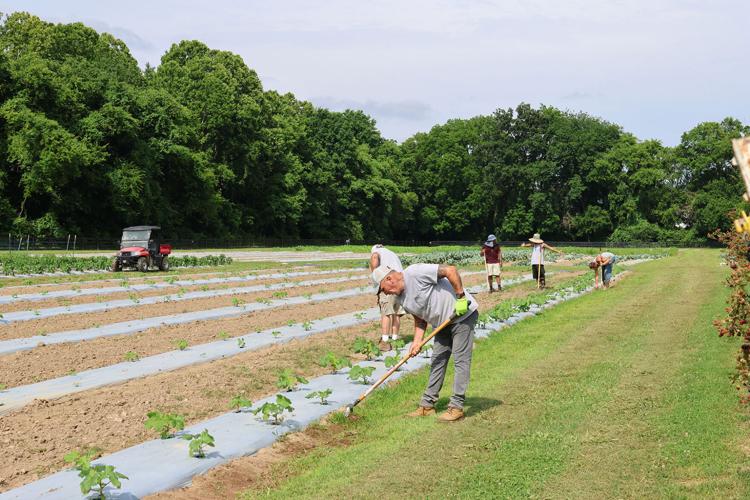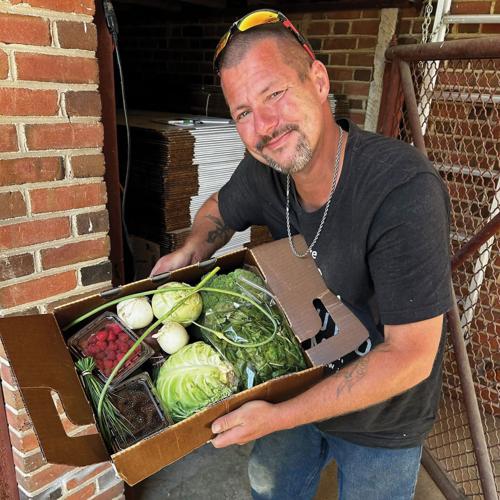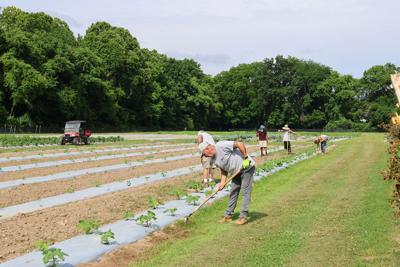This year, Cul2vate, a nonprofit that aims to address food insecurity in Nashville, grew 440,000 pounds of produce. Of that, 320,000 pounds was donated to organizations that help feed people in need in Nashville, including The Heimerdinger Foundation, Second Harvest Food Bank and The Nashville Food Project.
Those pounds of produce are just a small part of food dignity efforts in Nashville, says Jennifer Diehl, director of communications and development for Cul2vate. But it’s enough to make a difference.
It can be hard to remember in a city where luxury brand Hermès opens a store, and where tourists regularly drop hundreds on drinks and dancing on Broadway, but many Nashvillians regularly struggle to feed themselves and their families. The Living Wage Calculator from the Massachusetts Institute of Technology shows that in 2025, an adult in Davidson County needs to make $25.41/hour to earn a living wage — meaning they can cover their basic needs without outside assistance. But the minimum wage in Tennessee is just $7.25 an hour, less than the $7.52 an hour MIT reports is the poverty level. A 2024 poll from Vanderbilt Child Health found that 40 percent of Tennessee families with children say they are food insecure. As a result, Diehl says, many people work multiple jobs in order to feed themselves and their families.
Unfortunately, the situation does not look like it will improve in the short term. As of this writing, Supplemental Nutrition Assistance Program (SNAP) funds are likely to be frozen on Nov. 1 as a result of the current federal government shutdown. Cuts had been scheduled for 2026, so families already in need of assistance may need to find other sources for food.
Many of the organizations Cul2vate partners with help feed immigrant populations in the city. As federal funding for those organizations has ceased, the need has increased.
“We have seen a giant rise in need from our partners who need food and need funding,” Diehl says. In addition to supplying produce, Cul2vate has tried to help in other ways, such as delivering produce, as some organizations lost funding that paid for expenses like drivers. “It’s a delicate subject,” Diehl says of the crackdown on funding for feeding immigrants. But she notes that there are a lot of trickle-down effects on organizations that people might not realize.
While the scope of Nashville’s food insecurity can be overwhelming and depressing, the mood at Cul2vate is anything but.

Cul2vate farm
Founded in 2016, Cul2vate offers a multifaceted approach to assisting with food insecurity. Its model helps people (primarily but not exclusively men — women began in the program about five years ago) in recovery get back into the workforce while helping grow food for the hungry. The stories around the farm are more about joy and hope than they are about hardship.
That’s certainly been the case for Ziggy, who started as a “Cul2vator” about six months ago. He was one of 10 people who worked part time at the nonprofit while honing his job-readiness and life skills. Eight of the current Cul2vators, including Ziggy, will go on to Phase 2 this winter — a program that includes more classroom training in forestry and hospitality during the months when fields go fallow.
“This isn’t just a 9-to-5 job,” says Ziggy. “It’s not like an ordinary job where you’re going there and you’re facing these evils every day. I know I can come here and be safe, and they care, and they’re helping me every day to get through this.”
Cul2vators complete a number of tasks, including weeding, fertilizing and harvesting at several sites — among them Ellington Agricultural Center, Brentwood Baptist and several other community garden plots. Cul2vate recruits Cul2vators from Men of Valor, the post-prison re-entry program in which Ziggy was enrolled, and other organizations helping people in recovery.
It’s a big difference from founder Joey Lankford’s original vision: “We’ll have a couple greenhouses, we’ll give away a couple tomatoes,” Diehl says. Lankford has worked with a ministry in South Africa called Living Hope, and having a Bible-based food dignity program along with those tomatoes was always part of his vision. It fits with their motto: “Growing food and growing people.”
Cul2vate gets support for its programs in a number of ways, including through sales of produce, honey and other products at its Farm Store on Hogan Road in Ellington Agricultural Center, and its CSA boxes. Corporate partners, including Tractor Supply Co., and individuals make donations. There are events, such as an annual fundraising dinner called Fellowship on the Farm, and workshops, such as an upcoming pressed-flower class on Nov. 8. There are more activities during the growing season — March to November — but Cul2vate is busy behind the scenes in the offseason, and there are opportunities to donate and to volunteer. Experts in a variety of topics — from how to write a résumé to how to prune an apple tree — may be called on to speak to Phase 2 classes, and there are other opportunities to lead prayer and other ministry work.

Cul2vate CSA Box
For the 2025 harvest season, to reach more people, Cul2vate worked with Belmont University students involved in Enactus, an international social entrepreneurship club.
“We have been looking at food insecurity since I joined as a freshman,” says Belmont Enactus president Ava Munyer. “We started to get in the weeds with our downstream partners, like food banks, and we realized this huge supply issue of fresh local produce. We first tried to address this by building our own community garden and growing our own food to donate directly. While growing a few pounds of food is impressive and helpful, it’s not reaching the needs of our community. So we started looking for people in the community who were growing food on a large scale.”
After being connected to Cul2vate, the students developed marketing and messaging around its CSA program, including developing a structure where people can donate their CSA share to someone in need, in addition to buying it for personal use. The goal, says Belmont Enactus vice president Lily Stockwell, is to help Cul2vate bring in more revenue by shifting the percentage of produce it donates and the percentage it sells. This model allows for the food to still be donated while Cul2vate collects funds. They report that their efforts raised more than $13,000 this year.
Both Stockwell and Munyer are seniors, and are continuing to work with Cul2vate “for as long as they will let us,” Stockwell says.
That’s the kind of connection Diehl says Cul2vate has been building for the past decade. “Breaking bread with people and having a conversation around food is always very thoughtful and very biblically based,” she says. “Every day we see miracles in the work that we do.”









